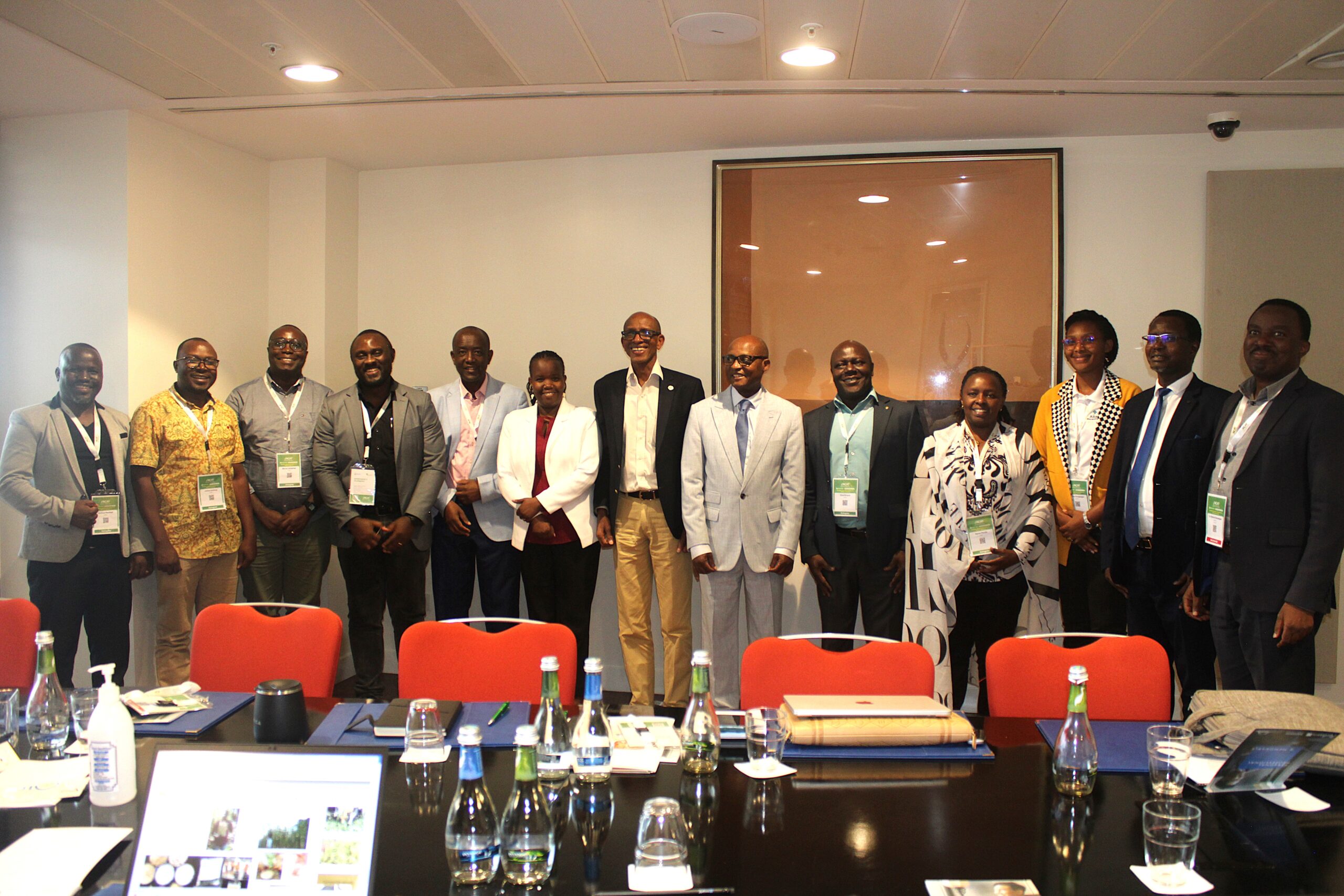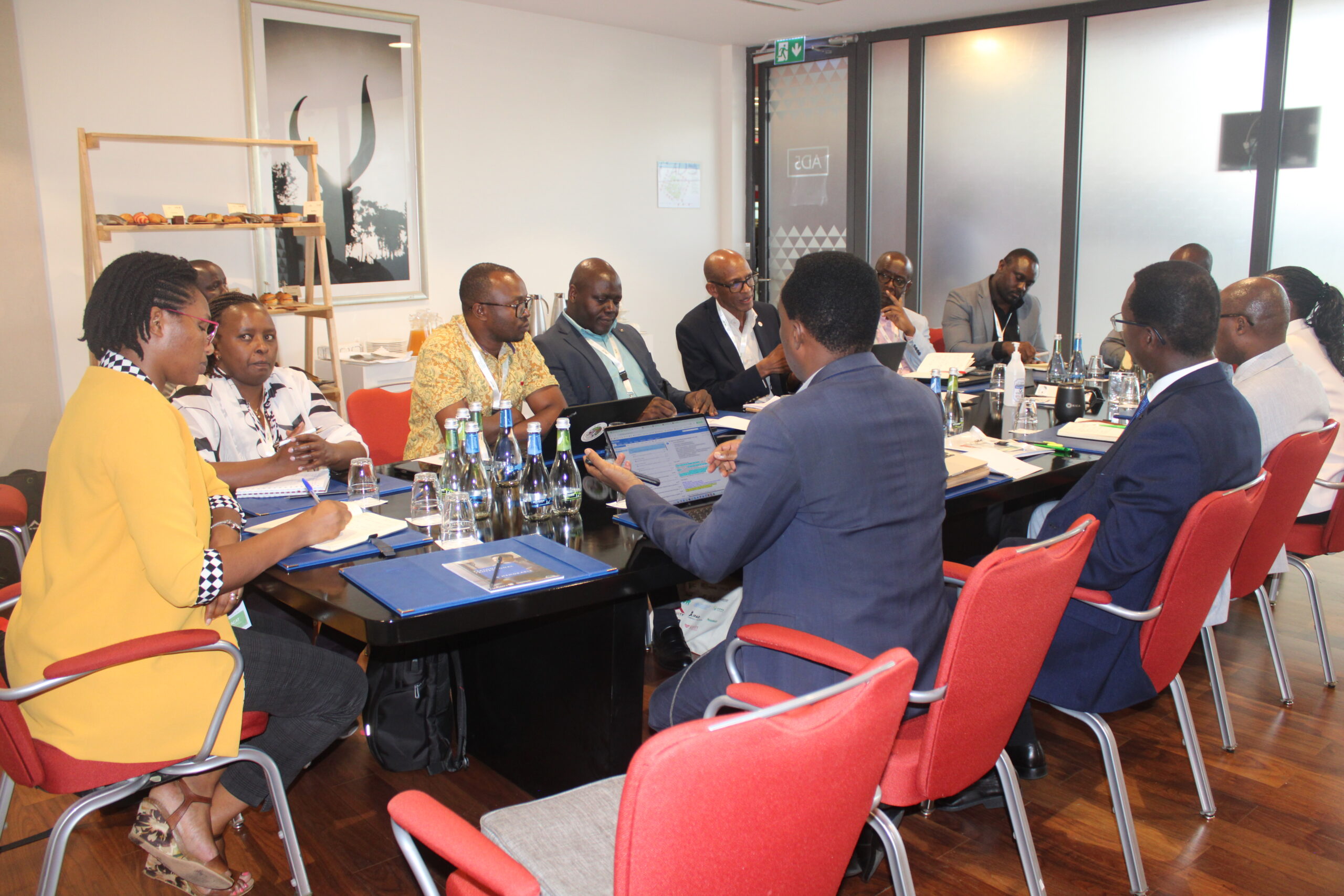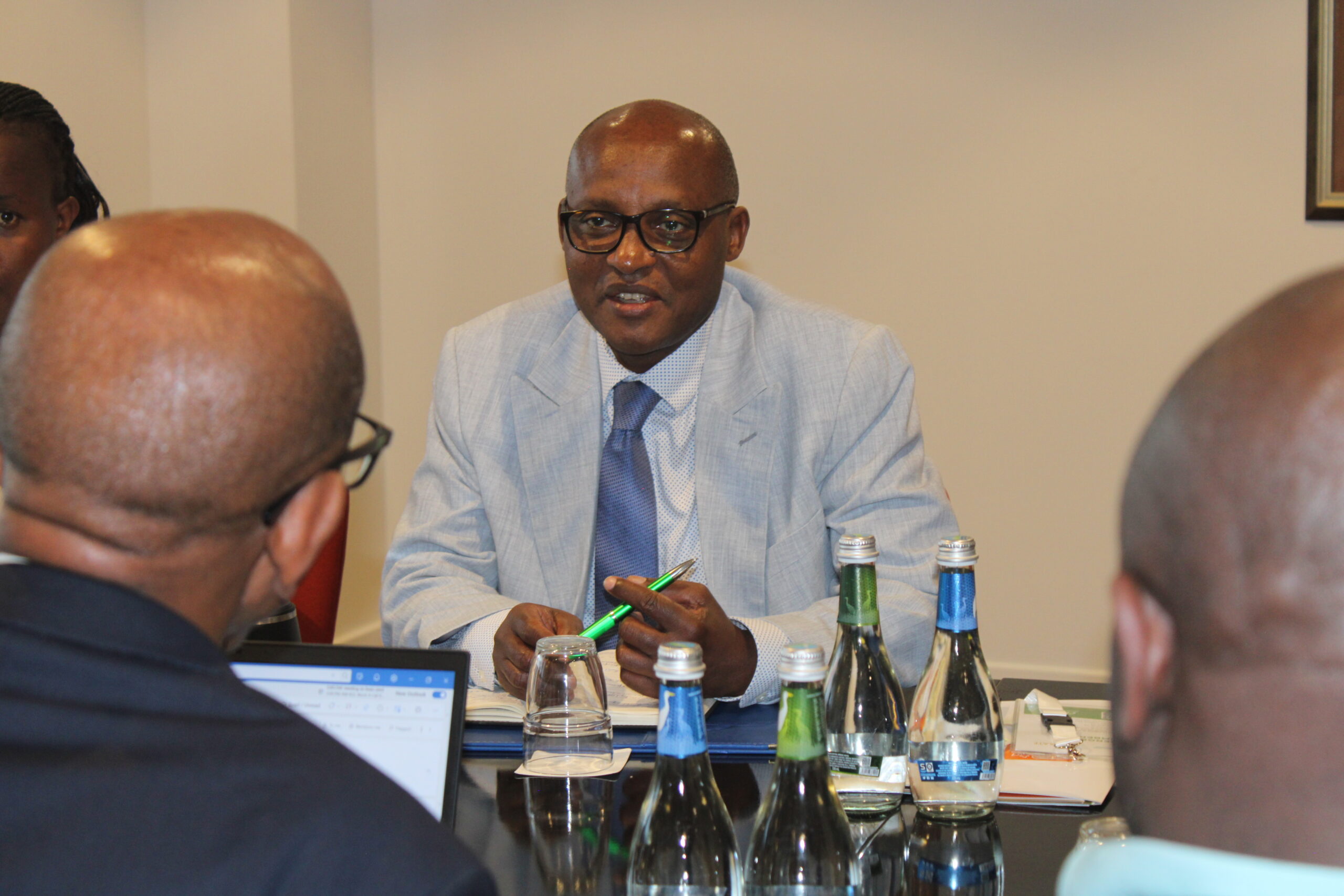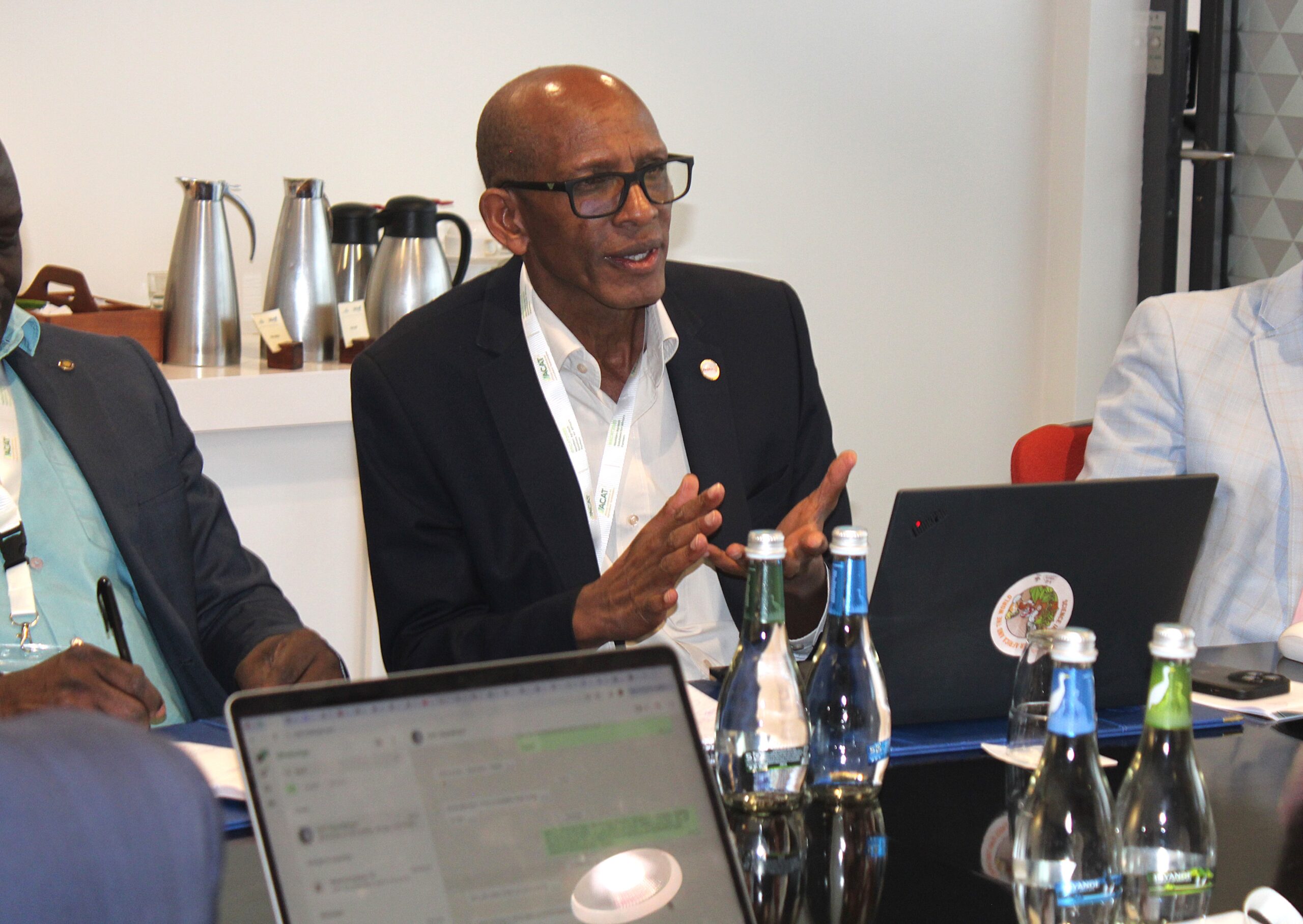By Yohane Chideya, Yvonne Munyangeri, Eliud Birachi, Justice Munthali, Justin Mabeya, Justus Ochieng, Agnes Manthi, Warren Arinaitwe, Ayuka Fombong (Icipe) and Jean Claude Rubyogo
As Rwanda continues with her efforts towards eradication of malnutrition, the bean crop continues to be a symbol of national resilience and agricultural innovation. Beans, widely produced by Rwandan farmers and deeply ingrained in local household diets, are now central to a revitalized collaboration between the Government of Rwanda and the Pan-Africa Bean Research Alliance (PABRA). This enduring and impactful partnership gained renewed momentum during a high-level sideline meeting at the Africa Agriculture Technologies Conference (ACAT) 2025 in Kigali.
The meeting, convened on 12th June 2025, gathered senior officials from the Ministry of Agriculture and Animal Resources (MINAGRI), the Rwanda Agriculture and Animal Resources Development Board (RAB), and PABRA, operating under the Alliance of Bioversity International and CIAT. The meeting marked a decisive strategic turning point, aiming to reposition Rwanda as a regional centre for climate-smart bean research and bean businesses, for accelerating improved national nutrition and better livelihoods.
Addressing malnutrition through staple crop innovation
Despite commendable progress in reducing childhood stunting, which decreased from 38% in 2015 to approximately 33% in 2020, malnutrition continues to pose a significant public health challenge, according to the 2020 Rwanda Demographic and Health Survey (DHS).
“Our most pressing concerns remain persistent malnutrition and stunting,” stated Hon. Dr. Mark Cyubahiro Bagabe, Minister of Agriculture and Animal Resources. “While the numbers are improving, greater efforts are necessary. I fully endorse this school feeding initiative as a highly innovative approach.”
Integral to this strategy is the systematic scaling of High Iron Beans (HIBs). These nutrient-dense varieties are specifically bred to combat iron deficiency, a leading contributor to anaemia and impaired cognitive development among children. Beans are already a fundamental component of school meals across the country, and integrating HIBs presents a distinct opportunity to significantly enhance nutritional value of school meals while simultaneously bolstering local production systems by providing market for grain.
Through the Sustainable School Feeding Innovations in Kigali Project, PABRA has effectively established foundational work. Over 300 schools have participated in pilot initiatives that included the establishment of bean demonstration plots, comprehensive training for 500 teachers, and the distribution of seeds to surrounding communities. Remarkably, some of these plots, spanning merely 10 by 10 meters, yielded up to 40 kilograms of climbing beans – a quantity sufficient to feed an entire class and serving as compelling proof of concept for broader scalability.
Mapping conducted in 2024 revealed that 450 schools possess over one hectare of arable land each. This represents substantial untapped potential for producing nutritious food precisely where it is most critically needed. This school-based production model not only considerably reduces procurement costs for the National School Feeding Program but also actively fosters agricultural literacy and promotes self-sufficiency among students and their respective communities.

Officials from MINAGRI, RAB, icipe, and PABRA pose for a group photo following the meeting in Kigali.
BRAINS: cultivating resilient value Chains
Beyond addressing nutritional challenges, the meeting critically examined how agriculture can serve as a cornerstone of economic resilience. The BRAINS initiative – Building Resilient African Bean and Insect Nutrition Systems – was formally introduced as a comprehensive strategy designed to strengthen agricultural value chains. This initiative integrally combines beans, beneficial insects, fruit trees, and biopesticides to enhance productivity, foster ecological balance, and diversify rural incomes.
In this context, the International Centre of Insect Physiology and Ecology (icipe) contributes essential expertise in developing insect-based solutions and biopesticides. These innovations are vital for reducing crop losses and limiting chemical use. “Strengthening the bean value chain through improved resilience, increased productivity, and robust market linkages is fundamental to achieving broader agricultural development objectives,” affirmed Dr. Eliud Birachi, Alliance’s Project Lead and Country Representative for Rwanda.
Revitalizing Rwanda’s role in regional breeding leadership
A prominent theme throughout the ACAT side meeting was Rwanda’s overarching ambition to re-establish its position as a regional centre for bean and potato breeding. For several decades, Rwanda has indeed played a leading role in the development and dissemination of improved bean varieties across Eastern and Southern Africa. Through the Alliance and its partners, varieties originating in Rwanda have made significant contributions to food security across the region.
“Since the 1980s, PABRA has achieved significant advancements in research and private sector collaboration,” stated Jean Claude Rubyogo, Director of PABRA. “We possess the capacity to achieve even more, and Rwanda is uniquely positioned to lead as a hub for bean production, with locally developed varieties poised to transform livelihoods across Africa.”
To achieve this vision, both parties clearly underscored the imperative of transitioning from individual, small-scale projects to larger, scalable investments. There was a unanimous call to actively engage financial institutions, agribusinesses, and regional bodies to unlock the next level of transformative impact.
Celebrating three decades of partnership and charting the future
The meeting also served as a prelude to the marking of PABRA’s 30th anniversary. Originating in Rwanda, PABRA has evolved into a continental platform for bean research, now boasting a significant footprint in 31 countries. Plans are actively underway to celebrate this milestone event in Rwanda, thereby reaffirming the country’s foundational and enduring role in shaping the Alliance’s legacy.
A key strategic announcement was the forthcoming launch of the PABRA Academy, which will deliver advanced capacity-building programs for 25 Master’s students and 30 PhD candidates in collaboration with leading African universities. This considerable investment in human capital is designed to cultivate the next generation of researchers and innovators who will lead the future of food systems transformation across the continent.
A shared vision rooted in African solutions
What transpired during the 2025 ACAT sideline meeting went beyond a mere exchange of ideas. It represented a profound renewed commitment to a shared vision of agriculture serving as a primary lever for improved nutrition, sustained economic growth, and enhanced climate resilience. Rwanda’s long-standing collaboration with PABRA is now being strategically recalibrated to effectively address the complex challenges of our era through science-led, African-owned solutions.
The strategic integration of High Iron Beans into school feeding programs and the comprehensive framework of the BRAINS initiative collectively demonstrate how targeted innovation, when collaboratively paired with political will and robust institutional partnerships, can drive meaningful and lasting transformation.
As Rwanda continues its dedicated investment in resilient and nutrition-sensitive agriculture, it sends a clear signal to the continent. With the right partnerships and an unwavering focus on scalable impact, African nations are exceptionally positioned to lead the way in nourishing their populations and shaping the global agricultural agenda.
This partnership extends beyond the cultivation of beans. It is fundamentally about fostering national sovereignty, promoting enduring resilience, and unlocking transformative opportunities, from the foundational classroom garden to the expansive regional marketplace. Rwanda and PABRA are providing a clear example that Africa is keenly observing. The future is indeed growing.
Commitments and next steps
The discussions at the ACAT Conference sideline meeting culminated in clear strategic directions, reinforcing Rwanda’s ambition to solidify its role as a regional hub for bean breeding. Key outcomes included the Minister’s commitment to spearhead the development of a collaborative proposal aimed at establishing Rwanda’s regional leadership in bean breeding. This pivotal engagement also secured ministerial advocacy for the integration of High Iron Beans into national school feeding programs, acknowledging their critical role in combating malnutrition through the Ministry of Education’s involvement.
This renewed collaboration also underscored the imperative for scientific endeavours to transcend conventional boundaries, leveraging regional initiatives for broader and more substantial impacts. The collective commitment to supporting the school feeding initiative aligns directly with national development programs, emphasizing the urgent need to secure adequate High Iron Bean seed sources for school garden initiatives commencing later in 2025 season. These actionable commitments underscore the profound dedication of both MINAGRI and the Alliance to driving agricultural innovation and food security across the continent.
_______________________________________________________________________________
Cover Photo: MINAGRI Minister Dr. Mark Cyubahiro Bagabe (right) and Bean Program Leader and PABRA Director Jean Claude Rubyogo after meeting in Kigali – Photos by Yohane Chideya




